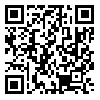Volume 10, Issue 2 (10-2018)
2018, 10(2): 123-130 |
Back to browse issues page
1- MSc in Geriatric Nursing, Research Center of Psychiatry and Behavioral Sciences, Mashhad University of Medical Sciences, Mashhad, Iran
2- Associate Professor, Social Determinants of Health Research Center, Department of Health Education and Health Promotion, School of Health, Mashhad University of Medical Science, Mashhad, Iran , PeymanN@mums.ac.ir
3- PhD of Gerontology, Associate Professor, Department of Internal-Surgery, Faculty of Nursing & Midwifery, Mashhad University of Medical Sciences, Mashhad, Iran
2- Associate Professor, Social Determinants of Health Research Center, Department of Health Education and Health Promotion, School of Health, Mashhad University of Medical Science, Mashhad, Iran , PeymanN@mums.ac.ir
3- PhD of Gerontology, Associate Professor, Department of Internal-Surgery, Faculty of Nursing & Midwifery, Mashhad University of Medical Sciences, Mashhad, Iran
Abstract: (4071 Views)
Introduction: Seniors are one of the most important age groups that are at the risk of medical illiteracy consequences. Considering the self-care and responsibility of older adults against various diseases in the elderly is a supportive strategy that requires access and awareness of health-related information and can be effective in reducing their mortality.
Methods: This study is a narrative review that use of international and Persian database like MEDLINE, Cochrane Library, PsychINFO, SID, Magiran, Google scholar, PubMed, ProQuest and Scopus was designed by “Tittle search method”. Articles were surveyed without time limit (since 2016) using the key words "health literacy", "mortality", and "older adult". The articles that have Inclusion criteria, were selected, reviewed and analyzed, separately. To extract data, all the final articles included in the process of study were extracted from a premade checklist.
Results: 228 of 234 article were excluded because of not assessing the relationship between the medical literacy and mortality, not having a tool for controlling the medical literacy, not specifically investigating the medical literacy in older adults and repetitiveness and finally 6 articles with the mentioned topic remained. Doing the review of all studies suggests that medical literacy have an effect on decreasing mortality in older adults with chronic diseases.
Conclusions: Medical literacy may be an effective strategy to improve older adults’ health status and decreases the mortality against the chronic diseases. According to the findings, training health-promoting behaviors to older adults and taking medical literacy serious was recommended.
Methods: This study is a narrative review that use of international and Persian database like MEDLINE, Cochrane Library, PsychINFO, SID, Magiran, Google scholar, PubMed, ProQuest and Scopus was designed by “Tittle search method”. Articles were surveyed without time limit (since 2016) using the key words "health literacy", "mortality", and "older adult". The articles that have Inclusion criteria, were selected, reviewed and analyzed, separately. To extract data, all the final articles included in the process of study were extracted from a premade checklist.
Results: 228 of 234 article were excluded because of not assessing the relationship between the medical literacy and mortality, not having a tool for controlling the medical literacy, not specifically investigating the medical literacy in older adults and repetitiveness and finally 6 articles with the mentioned topic remained. Doing the review of all studies suggests that medical literacy have an effect on decreasing mortality in older adults with chronic diseases.
Conclusions: Medical literacy may be an effective strategy to improve older adults’ health status and decreases the mortality against the chronic diseases. According to the findings, training health-promoting behaviors to older adults and taking medical literacy serious was recommended.
Type of Study: Review Article |
Subject:
Basic Sciences
Received: 2018/01/6 | Accepted: 2018/05/8 | Published: 2018/09/29
Received: 2018/01/6 | Accepted: 2018/05/8 | Published: 2018/09/29
| Rights and permissions | |
 |
This work is licensed under a Creative Commons Attribution-NonCommercial 4.0 International License. |




